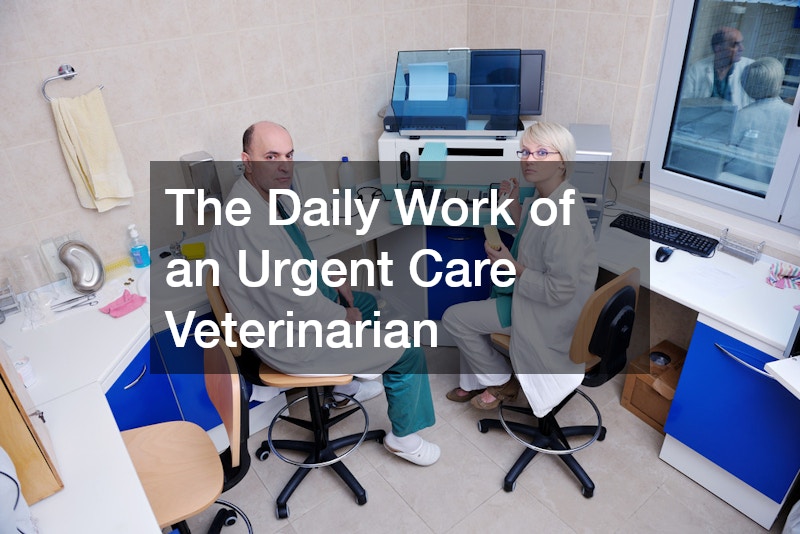An urgent care veterinarian‘s role is dynamic and demanding, filled with unexpected challenges and rewarding experiences. This article explores the daily work of an urgent care veterinarian, providing insights into their responsibilities, challenges, and the critical services they provide.
What are the Typical Duties of an Urgent Care Veterinarian?
Medical Examinations and Emergency Procedures
Urgent care veterinarians are tasked with conducting thorough medical examinations to assess the health status of pets brought in on an emergency basis. Their ability to perform emergency procedures swiftly and effectively can often mean the difference between life and death for an animal in critical condition.
Such veterinarians are adept at interpreting diagnostic test results with precision, allowing them to establish a rapid diagnosis. The fact that swift veterinary intervention can drastically improve outcomes highlights the importance of their role.
In addition to handling acute emergencies, they also devise follow-up care plans to ensure long-term recovery. These plans often involve liaising with primary care veterinarians to provide comprehensive care for the animals.
Client Education and Communication
Veterinarians must effectively communicate complex medical information to pet owners in a clear, understandable manner. This communication includes advising them on the necessary care plans, treatment options, and preventive measures to ensure the well-being of their pets.
Through education, veterinarians empower pet owners to make informed decisions regarding the health of their pets. This fosters trust and strengthens the veterinarian-client relationship, which is essential in promoting long-term care compliance.
Clear communication during stressful situations helps alleviate pet owners’ concerns, creating a more positive experience for all involved. By building strong relationships, veterinarians can ensure ongoing collaboration for the pet’s health.
How do Urgent Care Veterinarians Handle Stressful Situations?
Time Management and Prioritization
In the fast-paced environment of urgent care, veterinarians are required to expertly manage their time to address multiple cases efficiently. Prioritizing critical conditions ensures that animals in immediate need receive prompt attention and care.
Effective time management allows veterinarians to handle their workload efficiently, reducing the risk of burnout. This skill is invaluable in maintaining a high standard of care for all patients, even in the face of overwhelming demand.
The ability to triage effectively, identifying which pets require immediate intervention, is a crucial aspect of their work. Prioritization not only saves lives but also maintains an organized and controlled work environment.
Team Coordination and Support
Collaboration with veterinary technicians and other staff members is crucial to providing efficient and effective care. Veterinarians in urgent care settings rely on the support of their team to manage the high volume of cases they encounter daily.
Effective team coordination ensures that each patient’s needs are met promptly, with roles and responsibilities clearly defined among staff members. This team dynamic is essential in delivering seamless care in urgent situations.
Fostering a culture of support and mutual respect amongst the team is vital to creating a positive work environment. Such an environment enables professionals to thrive even under pressure, ensuring the best outcomes for both pets and owners.
What Type of Cases Do They Commonly Encounter?
Injury and Trauma Cases
Injuries resulting from accidents, fights, or sudden trauma often constitute a significant portion of cases seen by urgent care veterinarians. These cases require immediate attention and swift intervention to stabilize the animal and initiate treatment.
Urgent care settings are equipped to handle these critical situations due to the expertise of the veterinarians and the available medical resources. Quick actions and decisions are pivotal in ensuring the best possible outcomes for injured pets.
Furthermore, veterinarians work tirelessly to assess the extent of injuries, providing pain management and necessary surgical interventions. Their prompt response helps mitigate the long-term implications of such traumatic events on the animal’s health.
Sudden Illnesses and Allergic Reactions
Veterinarians often encounter cases involving acute illnesses and allergic reactions, requiring swift diagnosis and treatment plans. Such conditions can escalate quickly, making immediate medical intervention critical.
Diagnostic skills are put to the test as veterinarians must rapidly identify symptoms and determine the underlying cause of sudden illnesses. Their ability to act quickly is instrumental in reversing complications and ensuring the well-being of the pet.
In situations involving allergic reactions, urgent care veterinarians provide the necessary treatments to alleviate symptoms and avoid further complications. Their role is crucial in providing respite and preventing life-threatening scenarios.
How Do Urgent Care Veterinarians Stay Updated on the Latest Medical Practices?
Continuous Education and Certifications
Ongoing education and acquiring new certifications are essential for veterinarians to stay current with medical advancements. These educational pursuits ensure they are equipped with the latest knowledge to provide the highest standard of care.
Engagement in specialized training programs helps veterinarians hone their skills and enhance their expertise in urgent care. Keeping abreast of the latest developments in veterinary medicine allows them to implement innovative treatment approaches.
By investing in their education, veterinarians cultivate a culture of learning within their practice, benefiting both themselves and the animals they care for. This commitment to personal development translates to improved patient outcomes.
Involvement in Professional Networks
Active participation in veterinary associations and networks facilitates knowledge exchange and access to new research. This involvement ensures veterinarians remain well-informed about emerging trends in the field.
Professional networks offer opportunities for collaboration with peers, fostering the sharing of insights and experiences. Through these interactions, veterinarians gain new perspectives and solutions for complex cases.
Being part of a professional community also provides a support system, essential for coping with the demands of an urgent care veterinary practice. They form connections that drive progress and innovation within the profession.



